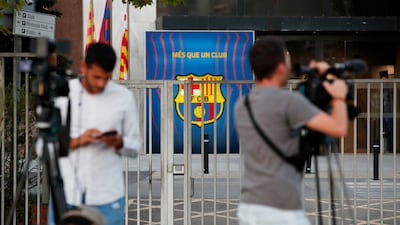No individual player is greater than the club, Barcelona president Joan Laporta has reminded the club’s shell-shocked supporters, a message also directed at Lionel Messi, whose talks over signing a new contract with the institution where he has spent more than half his life have collapsed.
“The post-Messi era starts now,” said Laporta, speaking on the morning after Barca issued a brief statement saying that Messi, record goalscorer and six times Ballon D’Or winner, would be leaving.
Laporta thanked Messi for his monumental contributions to Barca and praised the willingness the player had shown in his efforts to prolong his association. But the Barcelona president, frustrated by financial constraints on the club, posed a further question, by implication. Should one exceptional, individual footballer be considered greater than the league he plays in?
Messi, 34, and Barcelona have reached the point where their 20-year, glorious relationship is breaking because, in order to keep him, even at half the salary of his previous contract - which expired in June - Barca would infringe the Financial Fair Play (FFP) rules that operate in Spain’s La Liga.
Those rules stipulate that all clubs’ overall expenditure, on salaries and transfer fees, must stay within a ratio of projected revenues. And income has been hit badly by the pandemic. Laporta, elected as president in March, revealed that as negotiations advanced, apparently positively, for Messi to remain at Camp Nou, he believed that LaLiga might relax its rules on the allowed spending.
After all, the Covid-19 crisis, unexpected and unprecedented, obliged Barcelona to bar all paying spectators from their 98,000 stadium on public health grounds. That left them with ‘no margin’, according to Laporta, in balancing their books to stay within the FFP guidelines. But he had hoped, until this week, there may be some leeway from La Liga, who know that having Messi in Spanish football is a huge asset. “It seemed at one stage La Liga might open up the fair-play system,” said Laporta.
That door is now closed, the Barcelona president declared, and as he revealed that the current expenditure on players at the club runs at 110 per cent of income, he saw no way of reopening it. Messi’s advisers have given no hint they will return to the table with significantly reduced salary demands. His previous contract had been worth over €100m a year, and he had agreed to earning around half that to extend.
A plan, initiated last week by La Liga and the venture capital form CVC, for an injection of money to all Spanish clubs in the top two divisions, in exchange for CVC taking a stake in long-term - up to 50 years - of future earnings from broadcast rights, had appeared to offer a possible solution. But Laporta is firmly against that deal. “We will not mortgage the club for the next half a century,” he said.
La Liga’s president, Javier Tebas, responded immediately by saying that the proposed CVC investment, valued at an immediate €270m for Barcelona, would allow Barca the necessary financial flexibility to tackle their debts. “You know this,” insisted Tebas to Laporta, via a tweet sent during Laporta’s lengthy press conference on Friday. Tebas, anxious that La Liga not be blamed for a Messi exit, called the CVC deal the “solution.”
“That is not how we interpret it,” responded Laporta.
But in the breaking-up of the most successful partnership between any player and a single club of the last 20 years, there is no single villain. Barca wanted to keep Messi; “he wanted to stay,” said Laporta. But not on terms that could be met under Barcelona’s straightened financial circumstances.
The fault is spread across many parties. La Liga’s FFP system may be deemed inflexible by Barcelona, but there is no sugar-coating their dire economic problems. An internal audit, ordered by Laporta when he returned for a second mandate as president, has revealed “a situation far worse than we had been told.”
Nor have the club’s internal efforts to make space for a new Messi contract met the necessary targets. Efforts to sell, loan out or even give away high-earning players on the payroll have been frustrated by a stagnant transfer market. The huge fees spent since 2017 on the likes of Philippe Coutinho (€160m, from Liverpool) and Ousmane Dembele (up to €140m from Borussia Dortmund) are still being paid off. As for their salaries, both those players have been paid more while injured or on the substitutes’ bench at Barcelona than as members of the starting XI.
“The terrible management of the previous board pushed us over the limit and we have not had time to reverse the situation,” said Laporta. His predecessor as president, Josep Maria Bartomeu, resigned last year, a matter of weeks after Messi had asked to be released from the last year of his then contract.
Laporta, who is close to Messi, had mended the relationship, but he has not sufficiently fixed the club’s finances to accommodate his superstar. The Spanish league season starts next weekend, and there are new signings, mostly on free transfers, such as Sergio Aguero, Eric Garcia and Memphis Depay, who can only be registered if their combined salaries do not push Barcelona over the FFP limit.
Those players joined in the belief that Messi would probably be their captain and guiding light. He must now contemplate how ready he is to cast his brilliant light elsewhere. “The best player in the world has other offers,” said Laporta, “and he deserves to have everything. He has shown his love for Barcelona and his desire to stay. I am very sad but also convinced I have done the best for Barca.”









